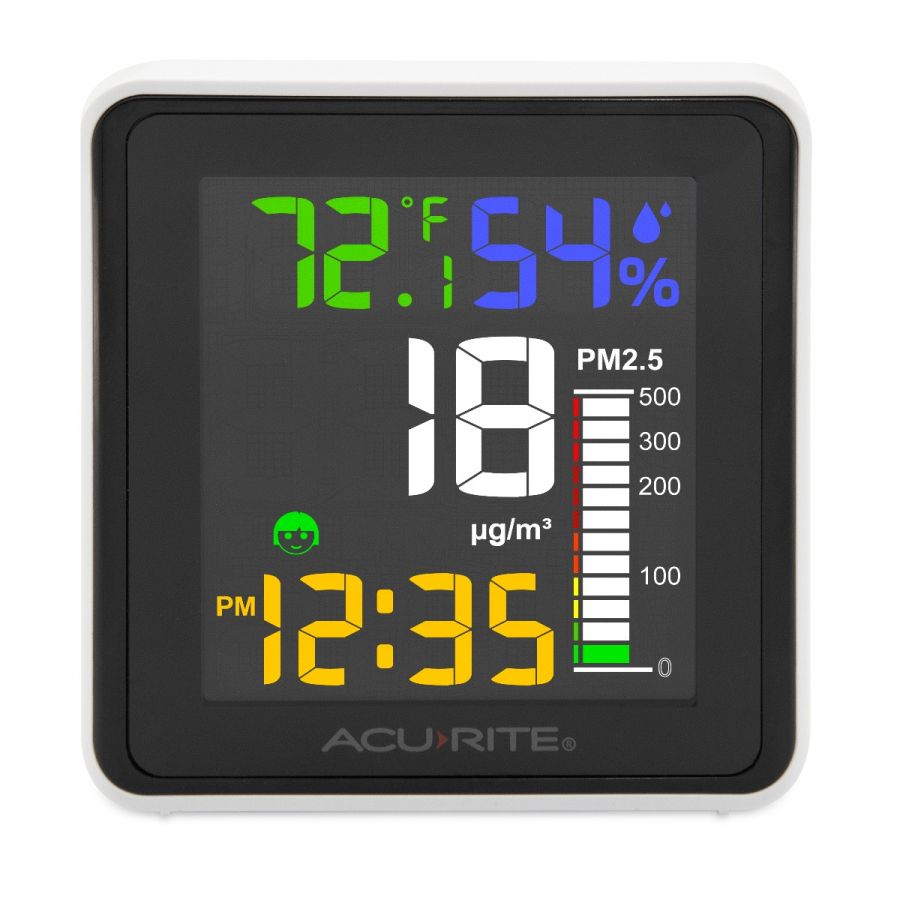What Can Happen If Indoor Air Quality is Poor?
As the COVID-19 pandemic continues to make everyone more aware of what they breathe in, home health experts recommend taking a serious look at indoor air quality (IAQ) and its importance for health and well-being. Here’s how to determine whether your home’s indoor air is safe to breathe and how AcuRite’s air quality sensors can give you the tools you need to help keep your space safe and your lungs healthy.
How Do You Measure IAQ?
Outdoor air quality is measured using the Air Quality Index (AQI), which runs from 0 to 500, with the higher the AQI value correlating to greater air pollution. Conversely, IAQ is measured using home air quality monitoring systems like the AcuRite AIR® Indoor Air Quality Monitor.

What Causes Poor IAQ?
Common culprits of poor IAQ include tobacco products, fuel-burning appliances, building materials containing asbestos or other harsh chemicals, cleaning products, and faulty heating and cooling systems. Organic sources can also contribute to poor IAQ, such as excess moisture and mold, outdoor pesticides or air pollution, and dangerous emissions like radon.
What Can Happen If IAQ Is Poor?
Is the air in your home making you sick? With so many potential indoor pollutants, it can be difficult to determine the source, but it may be time to investigate if you are experiencing poor air quality symptoms.
Poor IAQ: Mild Symptoms
In most cases, poor air quality produces mild symptoms that can be easily treated. However, it can sometimes be difficult to determine if these symptoms are from IAQ or other causes like allergies. Here are mild symptoms you should be aware of:
- Irritation of the eyes, nose, and throat
- Headaches
- Dizziness
- Fatigue
- Skin irritation
Take note of when these milder symptoms occur. If they tend to worsen at home and abate when you’re out and about, it may be due to the air quality inside your home. If your seasonal allergies or wintertime sniffles seem particularly acute, it may be more than just the pollen or frost in the air.
Poor IAQ: Severe Symptoms
When the air quality in your home is dangerous, or if you or anyone in your home has preexisting health conditions that affect breathing, poor IAQ can cause serious medical issues, including:
- Asthma attacks
- Long-term effects like respiratory or heart disease
- Certain types of cancer
If the IAQ in your home becomes so polluted that you’re experiencing these severe effects, open windows for ventilation and turn off any appliances or other sources of pollution that may be malfunctioning. If your symptoms get worse, make sure to seek medical attention when necessary.

Protect Yourself From Poor Air Quality
To help protect you and your family from poor IAQ, use the AcuRite AIR Indoor Air Quality Monitor and AcuRite 5-Sensor Indoor Humidity and Temperature Smart Home Environment System with My AcuRite®. These systems will monitor pollutants, humidity, and temperature in your home. With the My AcuRite app, you can access your sensors remotely from your mobile device and take steps to open windows and increase circulation in your home before you start developing poor air quality symptoms.
Clear the Air
Poor IAQ not only affects your health, but it can also affect the overall health and safety of your home. Mold, bacteria, mildew, and dust mites will form if there is increased indoor humidity, causing damage to your home and health. Inefficient ventilation, a leading cause of poor IAQ, can also cause heating, ventilating, and air conditioning systems to underperform.
When your AcuRite indoor air quality sensors tell you that the IAQ in your home is poor, make sure to act quickly to prevent any adverse health effects. Open windows and turn on fans for better ventilation, and invest in high-quality air purifiers that can continuously filter air. Use dehumidifiers and moisture-absorbing products in the dampest parts of your home and be mindful of any strange odors that may indicate a potential pollutant. Other easy ways to improve air quality include:
- Have your home inspected annually for pollutants
- Frequently change air filters in HVAC systems and purifiers
- Make sure your alarms have fresh batteries
- Replace old appliances or faulty mechanisms with newer and cleaner items
In the event of a chemical spill, like household ammonia or even paint, wear protective gear and open all windows before attempting to clean it up. However, if you or anyone else in your home ever experience shortness of breath, chest tightness, confusion, or acute respiratory symptoms like asthma attacks, leave your home immediately. This could be a sign of a more dangerous situation, like a gas leak, which must be handled by professional technicians to ensure that all pipe fittings and lines into your home are properly sealed and switched off.
Breathe Easy
IAQ can cause many undesirable health conditions such as irritation, fatigue, respiratory issues, mold, and more. Prevent this from happening by using AcuRite IAQ technology to alert you when conditions are deteriorating, and follow the above tips to improve your home’s air quality.






